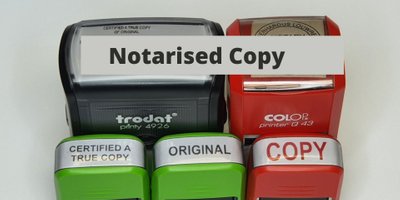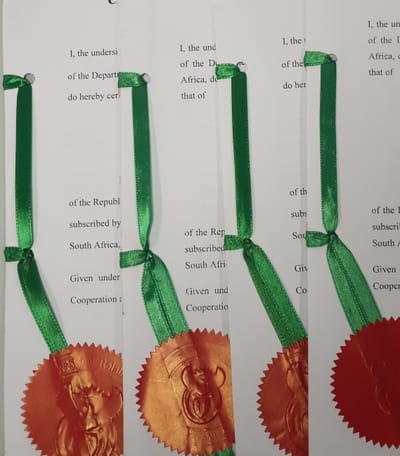Notarised Copies - APOSTILLE OR AUTHENTICATE NOTARISED COPIES of Documents
A Notarised copy is a photocopy of an original document which is verified by a notary public to be an accurate copy of the original.


How is it done? To do this, the notary must compare the original document to the copy (we can do the photocopying). He/she verifies that the copy is accurate, unaltered and all details match the original. We are happy to certify true copies. This is done quickly and easily. We are here to help you with your true copy needs.
When (and relevant types of documentation) to follow the route of the Public Notary or Sworn Translator and Registrar of the High Court:
There are documents pertaining to customary marriages; travel documents (passport) or identity documents; or documents such as an affidavit, power of attorney; work contracts; and / or translations, which has to be verified by a Public Notary (Attorney registered with the High Court) or translated by a Sworn Translator (if this service is required), where after the verified documents must then be taken to the Registrar of the High Court of South Africa – in the same jurisdiction as the Public Notary or Sworn Translator, before submitting to the Legalisation Section:
Step 1: Documents must be verified by a Public Notary (an Attorney registered at the High Court) or translated by a Sworn Translator (if the customer wishes the documentation to be translated) – of your choice. Note: The Public Notary will basically make a certified copy of the original document (which is the procedure, by which the copy of the original document, is “certified” as being “a true copy of the original document”).
If a country is signatory to Apostille Convention, the High Court should issue and affix an Apostille Certificate to the document. This document should not be submitted to the DIRCO – Legalisation Section. If the Convention applies, an Apostille is the only formality that is required to establish the origin of the public document – no additional requirement may be imposed to authenticate the origin of the public document.
Step 2: The certified documents or translated documents must then be taken to the Registrar of the High Court of South Africa – in the same jurisdiction as the Public Notary / Sworn Translator. The Registrar will verify the signature and/or the seal of the Public Notary / Sworn Translator. (Note: Documents to be Apostilled (for countries that are signatory to the Apostille Convention) and Authenticated (for non-signatory countries).
Step 3: After Authentication (for non-signatory countries) by the High Court, the documents must then be submitted to the DIRCO – Legalisation Section for further authentication.
The signature of a Notary Public, Justice of the Peace or any court employee who is not a Registrar has to be legalised by a Magistrate, Additional Magistrate or Assistant Magistrate or by a Registrar or Assistant Registrar of any division of the High Court of South Africa within the jurisdiction of which such Justice of the Peace exercises his or her function or such Notary Public is in practice, before documents are submitted to the Legalisation Section for legalisation purposes.
Documents must be bound together with the signature of the Registrar / Magistrate as the final signature of the first page, verifying the signature of the Public Notary or Justice of the Peace. The documents must be bound with a ribbon and red seal and the dry seal / stamp clearly visible on the document. A Registrar can only verify the signatures of a) an Attorney who is registered at the High Court as a Public Notary practicing in the same jurisdiction of the relevant court or b) a Sworn Translator who is registered at the High Court in the same jurisdiction of the relevant court.
The country of destination should be clearly specified to ensure the correct procedure is followed by the High Court.
ORDER AND GET A QUOTE ONLINE
Ordering and quoting online is simple and safe. Complete the secure online form to get a no-obligation quotation with a time estimate for completion. You can use the secure incorporated facility to upload any documents you would like us to check.


